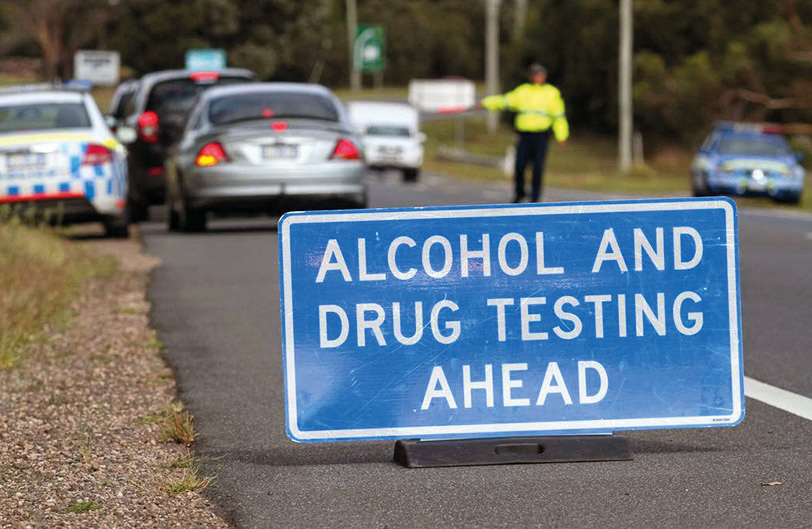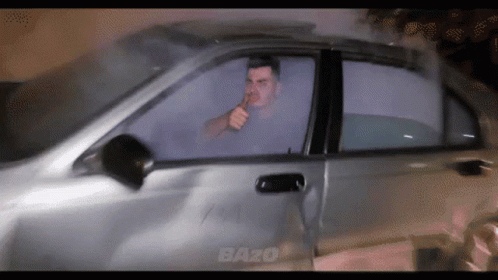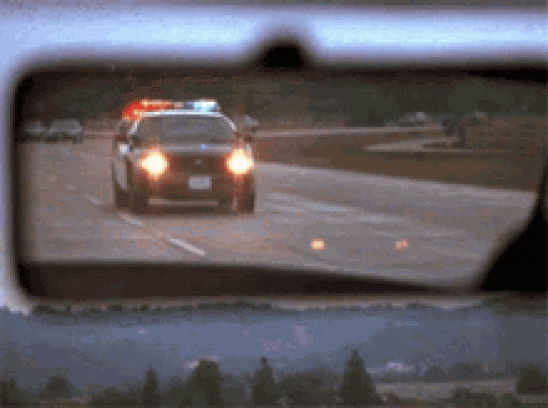
Update (March 2023): The Government has recently announced that random saliva testing has been delayed, as the required technology "doesn't exist." We've written an update about what this means for drivers.
This article looks at what we knew about the new law in May 2022.
Drug testing rules for drivers are set for a shakeup next year. From March 2023, police will be able to conduct random roadside drug tests on any driver on New Zealand roads.
For the more than 630,000 New Zealanders who used cannabis last year, this could be a very big deal.
The updated law represents a significant change in how police will manage drugs on our roads, so we thought it’d be useful to dig into what it all means.
What’s the current situation?
Right now, police can only ask you to take a drug impairment test if they suspect your ability to drive is compromised. If you are driving erratically, or a freshly ripped bong cloud is billowing out your car windows and the police spot you, they are likely to pull you over and ask you to take an impairment test.

Under both the current and new law, if your car looks like this, you’ll have some serious explaining to do.
During the impairment test, Police check your eyes, make you walk and turn, and balance on one leg, amongst other things. If you fail, you could be forbidden from driving for a set period and required to undergo a blood test. If certain drugs are detected in your blood, you could face a criminal conviction.
It’s in everyone’s interest that anyone who is impaired – whether they be high, drunk, woozy on prescription meds, or just bone-tired – doesn’t get behind the wheel.

If your pupils look like this, police may have some questions.
What will change under the new law?
The new law makes it legal for police to conduct random saliva-based roadside drug tests on any driver - without suspecting impairment, like how police currently conduct random alcohol breath tests.
What will roadside drug testing look like in practice?
If any prohibited drugs are found in your saliva, police will ask you to take a second saliva test to confirm the result.
At that point, you can either accept the penalty (a fine, temporary driving ban and demerit points) or disagree with it. If you disagree with it, you will be taken to get a blood test. If a prohibited drug is found in your blood, as above, you will face further penalties.
What do we know about the new tests and how they’ll work?
- The saliva sample will likely be collected from you via a mouth swab.
- Police will check samples for the presence of some of New Zealand’s most consumed drugs.
- The new law sets blood limits on a range of prescription medicines, including tramadol.
And what don’t we know?
- Exact details of how the oral testing regime will work - Police are still determining the technology they will use.
- The full list of drugs Police will test for (it will depend on the technology they deploy). We do know it’s likely to include drugs such as cannabis, methamphetamine, benzodiazepines, MDMA, cocaine, and opioids.
- If roadside testing will test for any prescription medicines, or, whether they will only be checked for in blood tests (e.g., when an accident has occurred). Note: If you are taking meds according to your doctor’s instructions and the prescription, you won’t get fined.

What penalties could I face for failing a test under the new law?
There are three different paths which could result in penalties for you under the new law.
1: You fail two saliva tests (but don’t request a blood test)
- You’ll receive a $200 fine, 50 demerit points, and immediately be suspended from driving for a minimum of 12 hours.
2: You fail two saliva tests and request a blood test to verify the results
- If you fail the blood test, the potential penalties are more severe than for a failed saliva test. You'll get either an infringement offence or a criminal charge, depending on the level of drugs detected in your system
3: Police notice you driving erratically and give you an impairment test (as they currently do)
- Police will continue to ask people to take impairment tests for drugs if they believe they are unfit to drive (e.g., your car keeps drifting across the centre line). Impairment tests are a separate and distinct process from random roadside saliva tests. If you fail a Police impairment test, you’ll be asked to take a blood test and may face criminal charges if drugs are detected.
Why the change?
The Government said this law was passed to make our roads safer by stopping drivers impaired by drugs from getting behind the wheel. It’s also part of a broader suite of road safety initiatives as part of the Road to Zero campaign, which aims for there to be zero death or serious injuries on New Zealand roads by 2050.
Many drugs slow your reaction times or affect your judgement, making you less safe behind the wheel. In 2020, 94 people were killed on New Zealand roads where the driver was found to have drugs or a mix of alcohol and other drugs in their system. 68 further drivers died with alcohol alone in their system.
What are the problems with the new law?
The biggest problem with the new testing regime is it won't test for impairment, only the presence of a drug.
Many drugs and medications, both legal and illegal, impact driving ability and contribute to fatal accidents. However, many drugs can be detected in your system long after their effects have worn off.
A saliva test can tell police if you've recently had a specific drug in your system, but it won't show how much you've had or whether your ability to drive is impaired by it.
So, for example, if you're one of the aforementioned 630,000+ New Zealanders who used cannabis last year, this could show up in your saliva, if you’ve used weed recently.
How long drugs stay in your system greatly depends on what drug was taken and how fast your metabolism is.
The New Zealand Drug Foundation says the new law will penalise people simply for having a drug in their system. It has advocated for a better impairment test to be developed that assesses impairment from any factor that could affect drivers, such as exhaustion.
FAQs
I’m a medicinal cannabis user - will I still be able to drive?
If you take a CBD-only product, it’s unlikely it will be detected by the roadside test. If it’s a product that has THC, it could be picked up.
If you have a prescription for medicinal cannabis, under section 16 of the Act, you have an exemption. We don’t yet know whether medicinal users will need to carry proof of their legal prescription (we’ll update you once we know for sure).
If it’s not a prescription and your product is from the illicit market, you could be caught under the new testing regime.
How sensitive will the saliva tests be?
We don’t yet know what machines the Police will use to analyse saliva samples collected from the public. Internationally, drug testing machines vary in terms of what drugs they test for and the levels at which they detect those drugs.
Police will try to calibrate devices so they won’t pick up cannabis use from a week ago but will detect use in the past few hours. However, realistically, that is next to impossible to achieve because people metabolise drugs differently.
How long will drugs show up in my saliva?
Substances can be detected in saliva testing long after they have stopped causing impairment. That means you may have recently used a substance, are no longer impaired, but could be fined and potentially charged with a drug driving offence.
How much drugs affect you physically and cognitively is determined by many factors. These include: how big you are, your fat/muscle ratio, how you consume a drug (e.g., smoking vs injecting), the dosage, whether you use it regularly or have consumed other substances, and how you are feeling – (tired, ill, hungry etc).
This makes it close to impossible to be certain how long a substance could be found in your saliva after use.
Approximate drug detection windows
THC: concentrations in saliva can remain high for several days. One study tested THC in subjects who use cannabis heavily. They found the drug at levels that would result in an infringement fee six days after last use. Even someone who has never used cannabis before may test positive in a saliva test up to 12 hours after consuming.
Methamphetamine: Potentially detectable in saliva 24 hours or longer after use. Long-term users are likely to have detectable levels in saliva for several days after dosing.
MDMA: May be detectable in your saliva for one to two days after ingestion. Taking multiple doses over a period of several hours may lengthen the detection window.
Opioids: May remain detectable for a window of between 5 hours and 4 days.
How many saliva tests will Police do each year?
Police conducted more than 1.5 million roadside alcohol breathalyser tests in the 2020-2021 period but will do far fewer for drugs. Drug tests are much more expensive and take much longer to conduct than breathalysers. Police aim to work towards around 66,000 random roadside tests per year.
When will the law be reviewed?
Once in force, the new law will be up for review after three years.
If you have further questions about this law, you can contact us.
More reading on roadside drug testing:
Norml roadside drug testing press release
Chris Fowlie’s summary of this issue - Daily Blog
Drug Foundation Executive Director Sarah Helm on the new law (2021)
Related stories
Recent stories
SMART Recovery: Support groups without the need for abstinence or a higher power
We explore what it is and how it has positively affected people's lives.
Kamini: What you need to know
EDs and doctors have seen more people seeking help for opioid overdose, withdrawal, and addiction after using kamini. Here's what you need to know about the opioid-containing remedy.
Pseudoephedrine: what you need to know
Pseudoephedrine is back on the shelves. Here's what you need to know about this cold & flu medication.